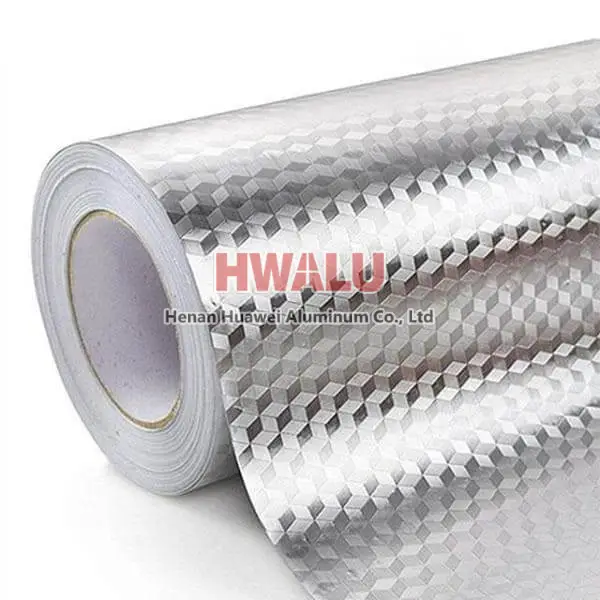What is Extra-heavy duty aluminum foil Extra-heavy duty aluminum foil is a type of aluminum foil that is thicker and more durable than standard or heavy-duty aluminum foil. It is designed to withstand higher temperatures and provide extra strength, making it suitable for more demanding applications in the kitchen and beyond. Extra-heavy duty aluminum foil common alloys The common alloy used for extra-heavy ...
Single zero aluminum foil refers to aluminum foil with a thickness between 0.01mm ( 10 micron ) and 0.1mm ( 100 micron ). 0.01mm ( 10 micron ), 0.011mm ( 11 micron ), 0.012mm ( 12 micron ), 0.13mm ( 13 micron ), 0.14mm ( 14 micron ), 0.15mm ( 15 micron ), 0.16mm ( 16 micron ), 0.17mm ( 17 micron ), 0.18mm ( 18 micron ), 0.19mm ( 19 micron ) 0.02mm ( 20 micron ), 0.021mm ( 21 micron ), 0.022mm ( 22 micron ...
What are the common aluminum foil customizations? Thickness: The thickness of the aluminium foil can be customized according to the specific application. For example, packaging foil is usually thinner than kitchen foil. Size: Aluminum foil can be customized according to the size required, for example, aluminium foil for cooking can be cut to the size of a baking tray. Surface treatment: Aluminum foil can b ...
What is cable aluminum foil? Cable aluminum foil is a special type of aluminum foil used for cable structures. It is processed from aluminum alloy raw materials through cold rolling, hot rolling and other processes. Aluminum foil used in cables has excellent electrical conductivity and good corrosion resistance, especially in the telecommunications and electrical industries, playing an important role. 8011 ...
Specifications of sarin coated embossed aluminum foil Alloy model 1100 or 1200 3003 or 3004 5052, 5083, 5754 8011, 8079 Thickness 0.006mm-0.2mm Width 200mm-1600mm Flower type Common flower types include five flowers, tiger skin, pearl and so on. Coating sarin coating, color: gold, silver, red, green, blue, etc. Paper core inner diameter 76mm or 152mm Packing method w ...
1-Moisture-proof and anti-oxidation: Aluminum foil paper can effectively prevent food from getting wet and oxidized and cause deterioration, so as to maintain the freshness and taste of food. 2-Thermal insulation: The thermal conductivity of aluminum foil paper is very low, which can effectively insulate heat and prevent heat loss. 3-Blocking UV rays: Aluminum foil can effectively block UV rays and protect ...
Beer caps can be packed in aluminum foil. Aluminum foil is a commonly used packaging material due to its excellent barrier properties, protecting contents from light, moisture and external contaminants. It helps maintain the freshness and quality of the product. Beer caps are small, lightweight and can be easily wrapped or packaged in aluminum foil. There are several reasons for doing this, including: 1 ...
It is generally believed that the single-sheet rolling speed of the aluminum foil should reach 80% of the rolling design speed of the rolling mill. Huawei Aluminum Company introduced a 1500 mm four-high irreversible aluminum foil roughing mill from Germany ACIIENACH. The design speed is 2 000 m/min. At present, the single-sheet aluminum foil rolling speed is basically at the level of 600m/miT, and the domestic si ...
Aluminum foil rolling produces plastic deformation under the conditions of roll-free rolling. At this time, the rolling mill frame is elastically deformed and the rolls are elastically flattened. When the thickness of the rolled piece reaches a smaller and more limited thickness h. When the rolling pressure has no effect, it is very difficult to make the rolled piece thinner. Usually two pieces of aluminum foi ...
ITEM SIZE (MM) ALLOY / TEMPER WEIGHT (KGS) ALUMINIUM FOIL, ID: 76MM, ROLL LENGTH: 12000 - 13000 meters 1 0.007*1270 1235 O 18000.00
Is the aluminum foil in the oven toxic? Please pay attention to the difference between the oven and the microwave. They have different heating principles and different utensils. The oven is usually heated by electric heating wires or electric heating pipes. Microwave ovens rely on microwaves to heat. The oven heating tube is a heating element that can heat the air and food in the oven after the oven is pow ...







